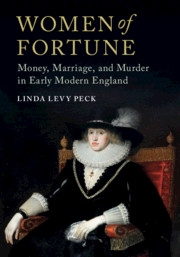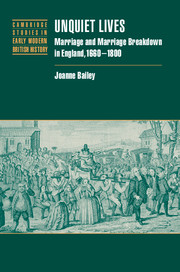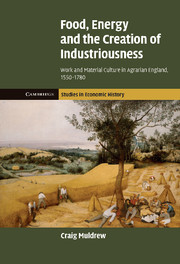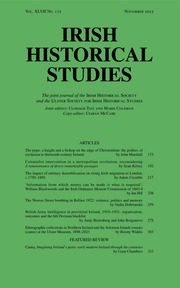Women of Fortune
Money, Marriage, and Murder in Early Modern England
- Author: Linda Levy Peck, George Washington University, Washington DC
- Date Published: October 2018
- availability: Available
- format: Hardback
- isbn: 9781107034020
Hardback
Other available formats:
eBook
Looking for an inspection copy?
This title is not currently available for inspection. However, if you are interested in the title for your course we can consider offering an inspection copy. To register your interest please contact asiamktg@cambridge.org providing details of the course you are teaching.
-
Women of Fortune tells the compelling story of mercantile wealth, arranged marriages, and merchant heiresses who asserted their rights despite loss, imprisonment, and murder. Following three generations of the Bennet and Morewood families, who made their fortune in Crown finance, the East Indies, the Americas, and moneylending, Linda Levy Peck explores the changing society, economy, and culture of early modern England. The heiresses - curious, intrepid, entrepreneurial, scholarly - married into the aristocracy, fought for their property, and wrote philosophy. One spent years on the Grand Tour. Her life in Europe, despite the outbreak of war, is vividly documented. Another's husband went to debtors' prison. She recovered the fortune and bought shares. Husbands, sons, and contemporaries challenged their independence legally, financially, even violently, but new forms of wealth, education, and the law enabled these heiresses to insist on their own agency, create their own identities, and provide examples for later generations.
Read more- Casts fresh light on the lives and agency of early modern heiresses beyond their usual roles as transmitters of property
- Explains how major elements of the English economy worked in practice in the early modern period through the story of several families across three generations
- Provides a vivid account of one woman's experience of the Grand Tour that encompassed travel, sightseeing, romance, and war
Reviews & endorsements
'In this exhaustively researched and skillfully presented book, Linda Levy Peck recasts passive heiresses as active wives. Promoting their own ambitions and reshaping the families into which they married, these 'women of fortune' creatively re-energized elite cultures and pushed out the boundaries of female opportunity. Peck rightly and rigorously positions them at the very center of England's early modern social order.' Cynthia Herrup, J. R. Hubbard Professor of History Emerita, University of Southern California
See more reviews'Women of Fortune opens with the grim details of the murder of a noblewoman described by a peer as 'the most sordid person who ever lived …' and then explores a huge web of connection across a whole century and across city, county, and a continent, opening up the economic, social, and cultural dimensions of that web, seen mainly through the eyes of its wonderfully feisty female members. This book is as illuminating as it is evocative.' John Morrill, Professor Emeritus of British and Irish History, University of Cambridge
'In this important book, Linda Levy Peck traces the fortunes of the descendants of two London apprentices who made good in early seventeenth-century London. The agency and enterprise of women are at the heart of her story, mostly merry widows making and spending money, travelling the continent, although in one unfortunate case, being murdered for their gold by the local butcher. Engaging detail and vivid personalities combine in a compelling account of fundamental transformation over a century and a half - of social mobility, new forms of wealth and credit, and improved opportunities for elite women.' Ann Hughes, Keele University
'Peck charts the destinies of three generations of the Bennet and Morewood families. Sir Thomas Bennet the elder was the founder of the dynasty, earning a fortune in the cloth trade, enriching himself through Crown finance, and ending as Lord Mayor of London. Like Bennet, Gilbert Morewood was the scion of minor gentry who became a successful merchant and London oligarch. … One learns much about the rationale for arranged marriages, brokers and marriage portions … Peck is particularly effective in showing how female heiresses protected their inheritances, passed them onto their children, and crafted independent identities for themselves. The most compelling section deals with the grisly murder of Grace Bennet the elder, who was killed by a butcher in search of gold allegedly buried on her estate. Portraits of worthies and other reproductions of period art adorn the text.' D. R. Bisson, Choice
'Levy Peck does a meticulous job of mining her sources, which include family papers, accounts, correspondence, company records, probate, and court documents. What is striking is that the Bennett-Morewood women emerge fully formed from the pages despite the fact that few to none of the sources are in their own words or voices. This book is a primer in how to bring women into a story even when that story was told and dominated by men.' Amy M. Froide, The Journal of Interdisciplinary History
'Levy Peck's depth of research is outstanding, including more than twenty archives in the UK and US, bringing to light previously unpublished sources. Where correspondence for her main protagonists is missing, she has reconstructed their activities through financial accounts and lawsuits. Although the book focuses on a small number of elite women, it allows for much broader conclusions to be drawn, about the changing nature of financial opportunity and investment in early modern England, the persistence of elite ties to country and city, and the central role of women in harvesting and protecting property and inheritance for future generations.' Misha Ewen, Cultural and Social History
'… this work is enlightening and exciting to read and provides an unusual and striking impression of the changing lives of three generations …' Margrit Schulte Beerbühl, Historische Zeitschrift
'This book is a very good read … The author has painted a fascinating picture of this gallery of individuals, whose lives were so different in outcomes and yet had similarities.' Janette Rutterford, The Economic History Review
Customer reviews
Not yet reviewed
Be the first to review
Review was not posted due to profanity
×Product details
- Date Published: October 2018
- format: Hardback
- isbn: 9781107034020
- length: 350 pages
- dimensions: 253 x 180 x 20 mm
- weight: 0.91kg
- contains: 16 b/w illus. 16 colour illus.
- availability: Available
Table of Contents
List of figures
Acknowledgments
List of abbreviations
Family trees
Introduction
Part I. Money:
1. 'The Great Man of Buckinghamshire' The Lord Mayor, the Benefactor, and the moneylender: the Bennets
2. 'My personal estate which God of his infinite goodness hath lent me' the grocer's apprentice: the Morewoods
Part II. Marriage:
3. 'The £30,000 widow' and Kensington House: the Finches, the Cliftons, and the Conways
4. 'I was never one of fortune's darlings' city and country: the Gresleys
5. 'One of the greatest fortunes in England' money, marriage and mobility: the Bennet heiresses
Part III. Murder:
6. “The most sordid person that ever lived' the murder of Grace Bennet
Part IV. Metropolis:
7. 'The Countess of Salisbury who loved travelling' from Hatfield House to the Grand Tour: the Earl and Countess of Salisbury
8. 'A seventh son and beau major shall gain my Lady Salisbury' courting the Countess: George Jocelyn
9. 'Diverse great troubles and misfortunes' losing a fortune: John and Grace Bennet
10. 'Fortune's darlings' single women in Hanoverian London: the Dowager Countess of Salisbury and Grace Bennet
Conclusion
Bibliography
Index.
Sorry, this resource is locked
Please register or sign in to request access. If you are having problems accessing these resources please email lecturers@cambridge.org
Register Sign in» Proceed
You are now leaving the Cambridge University Press website. Your eBook purchase and download will be completed by our partner www.ebooks.com. Please see the permission section of the www.ebooks.com catalogue page for details of the print & copy limits on our eBooks.
Continue ×Are you sure you want to delete your account?
This cannot be undone.
Thank you for your feedback which will help us improve our service.
If you requested a response, we will make sure to get back to you shortly.
×











